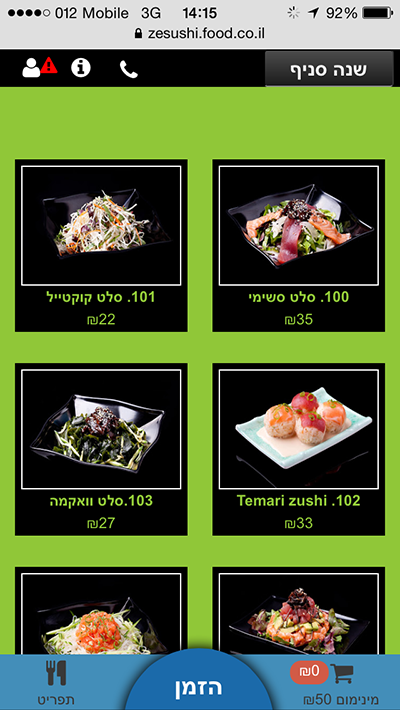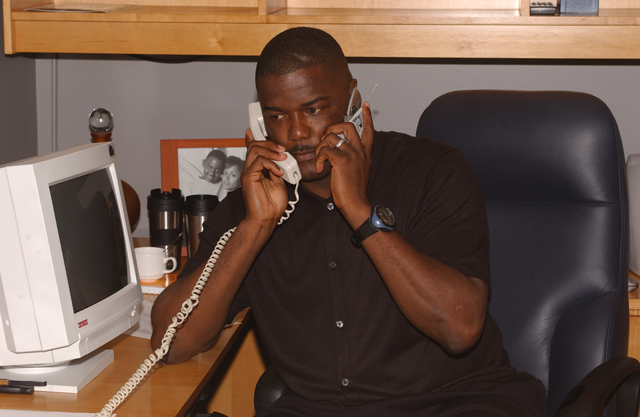Exactly why is it better when there's "an app for that"?
Having "an app for that" often feels more convenient, but is it?
April 7, 2014
How did you feel when you learned that your favorite takeout place just made it possible to place your order online? You were probably happy. But did you ask yourself why? Why do we peremptorily rejoice when there's "an app for that"?
Everyone's first answer would be convenience. Yet the website for my local sushi place is inconvenient in many ways. I can never remember where to find my favorite dish (Is the "Tuna & Salmon salad" an appetizer or a salad?) and I always need to type something ("extra ginger").
Typing sucks. Typing on an iPhone really sucks. As much as lightweight touchscreen devices afford us, they come at the cost of a comfortable, accurate typing experience. And autocorrect systems aren't yet smart enough to figure out that when I mistyped "extra inger" on a sushi restaurant's website, I more likely meant "extra ginger" than "extra infer" (at least it wasn't "extra finger").
The mobile web app for my go-to sushi place. Is this convenient?
Perhaps you're thinking, "A good app would enable you to tap for extra ginger". Sure, that would help. But that still requires you to navigate hierarchical information across several screens until you've found the place where you can tap for extra ginger. And if you're someone who doesn't want extra ginger, that tappable item is clutter.
If only I could skip all the menus and just tell the iPhone exactly what I wanted! Voiceover, Siri, and Google Now aren't sophisticated enough yet to take orders by voice. There is, however, one service that employs real human beings who can take your order exactly as you dictate. Want the name of that app? It's called "the guys at the restaurant who stand by the phone and take orders".
Beyond convenience
Of course, I'm not arguing for more people to place takeout orders by phone. Apps feel more convenient, so apps win. You might say that feeling more convenient makes them more convenient. Such is the case with voice calls vs. messaging: even though it's often faster to make plans with someone by talking to them, many of us eschew the phone for messaging.
So what is it that makes apps feel so much more convenient than the old, more general ways of doing things?
One reason might be misanthropy. That is, people don't like interacting with other people. Not only do I think there are too many counterexamples to this (people love interacting with one another through apps), but it's also not specific or explanatory enough. Convenience can't be explained as a means to avoid human beings.

Everyone avoids using the phone nowadays, even though it's a great app!
It requires more physical work to use your voice to talk to someone, or use your arm to hail a cab, than it is to use your fingers to tap on an app. This is true. All things being equal I'd rather tap for something than have to use my arms, legs, hands and voice. But these things are not always equal.
It requires more cognitive work to talk to someone (or, in the case of Siri, something) than to interact with a computer interface. This is very true. In a conversation, you not only must talk but you must also listen and react. On top of that, you need to maintain some awareness of your surroundings while talking.
Humans are much less predictable than computers. This is not only true, but I think it's the crux of why we prefer an "app for that". The guy who takes the phone orders at the restaurant might put you on hold; computers also put you on hold when you get a loading spinner, but this has become far less frequent as devices and networks have become much faster. The guy on the phone might also misunderstand "Tuna & Salmon Salad" for "Tuna & Salmon roll"; the fact that you wouldn't be surprised if Siri made this same mistake is why people don't rely on Siri all that much, but this will undoubtedly improve.
The problems with convenience
Seems like we've got this mostly settled, right? It's better to have "an app for that" when:
The app is less physically and cognitively draining than the analogous task (whether or not it's in some other app).
Input to and output from the app are highly predictable. When you tap on stuff, the thing that you expected to happen actually happens.
For some tasks the buck stops here. Spotify makes it way easier to listen to music, Vine makes it easy to share video, and Uber makes it easier to hail a cab.
Yet there are also cognitive costs to having an app for everything you could possibly do. As Dustin Curtis put it:
I hate the mentality that everything should be made into apps on a single device. No. Apps are fucking annoying and have cognitive overhead.
— dustin curtis (@dcurtis) April 4, 2014Casey Winters in an excellent blog post on unbundling:
Even if app discovery is solved (and that’s a hard problem), the rate of successful unbundling certainly seems like it has to be limited by 1) the amount of space on someone’s phone, and 2) user’s inability to be aware of hundreds of niche services they may need at any time. (emphasis mine)
Incidentally (or not), Casey Winters wrote this while at GrubHub, which aggregates restaurant ordering into a single app (in a way, the bundling of restaurant touch points). This relieves the cognitive burden of having to remember how to navigate my sushi place's web app, but also normalizes menus in a way that causes the problems I mentioned earlier: The pain of scrolling through hierarchical menus that aren't necessarily aligned with how you want to browse them. If you've ever lamented that the menu for one restaurant on GrubHub looks just like the menu for another, you might agree that there's such a thing as overconvenience.
Which brings us to the other way in which it's not good to have an app that is optimal and predictable: We don't always want to do things in the most organized, maximally efficient way. How many times have you emailed something (often to yourself!), even though you have an app for that?
Or, how many times have you posed a question via chat message, Twitter or Jelly when the answer was easy to get from Quora, Wikipedia, or Google (the raison d'être for one of my favorite little services, Let Me Google That For You)? We do these things partly because we're lazy, partly because we're often cognitively drained, but partly also because asking people questions is inconvenient and unpredictable in all the ways that make human interaction fun.
It's not all about getting things done
I'd add this to the "convenience" equation: It's better to have an app for that when it helps you do other things you want to do. Time saved using Uber is time spent doing other things you want to do, but time spent Googling for an answer to a question might not be, since asking people might be half the fun.
The notion of "helping you do other things you want to do" is tricky to pin down, as it's highly dependent on what you're doing, where you're doing it, etc. If I need an answer now, for example, I won't tweet the question, I'll Google it. If I need to make sure that I view a certain note at a certain time later in the day, I won't email it to myself, I'll add it to my high-powered, dedicated note-taking app, Evernote, and attach a reminder to the note.
And if I'm walking home from work, listening to Spotify on my earbuds while planning to order sushi for dinner, I'm going to use my sushi place's crappy web app instead of calling them. Huh? Why not call them, in spite of the fact that (as I argued in the beginning of this post) that it might be faster, easier, and overall more convenient? Because when I make a phone call I have to stop listening to the song I'm enjoying on Spotify.
My best use case for my sushi place's mobile website is when I want sushi but don't want to stop listening to music. For that function it's awfully convenient. It's just not the that in "an app for that" that we often take for granted.
